Search the latest and greatest job opportunities in sport
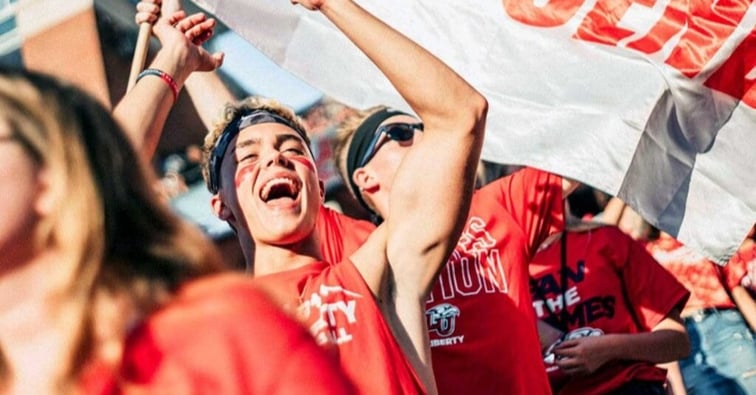 Rui Biscaia, a renowned fan engagement researcher, explains how sports organizations have been changing their perception of fan engagement. “Fans have a voice and organizations must know how to react to messages from them, even if they are critical,” he warns.
Rui Biscaia, a renowned fan engagement researcher, explains how sports organizations have been changing their perception of fan engagement. “Fans have a voice and organizations must know how to react to messages from them, even if they are critical,” he warns.
Here we analyze the relevance of fan engagement for sports organizations. In a second part, we will look at the role played by the athlete in this interaction with the fans.There has always been debate about who is the main protagonist in the sporting ecosystem. For some, it will always be the club above all else, because ‘the players pass, the club remains’. For others, the athlete, who is followed wherever he goes because of his individual charisma, is the key player. And, in some sports, there are even those who argue that, without the support of sponsors, there would be no competition. But if there is one thing that everyone agrees on, it is that without fans, professional sport would be meaningless. And that is what fan engagement is based on, on giving meaning to this connection between sports organizations, athletes, sponsors, stakeholders and fans.
What has changed over the years is who gives the most in that relationship, and how deep it can go from attraction to commitment and from there to loyalty. We talk to Rui Biscaia, university professor and renowned researcher in fan engagement, about good and bad practices. Today we focus on sports organizations. The day has not yet arrived when fans will have a vote in all the decisions they make, but they have a voice and infinite channels for their opinion to reach loud and clear wherever it needs to go.
 Rui Biscaia is a senior lecturer at the University of Bath. Previously, he worked at Coventry University, University of Lisbon and Universidade Europeia. Rui’s main research focus is on bridging the gaps between sport consumers, organizations, athletes and sponsors, with a special interest in aspects such as consumption experiences, fan well-being, online environments, service quality, sport brand management, sponsorship management and mega sport events, among others. Rui has developed projects with researchers from Portugal, Spain, England, France, Germany, Estonia, Brazil, the United States, Canada, Japan, South Korea, Australia and New Zealand, and has published 40+ peer-reviewed articles in journals such as the Journal of Business Research, Journal of Sport Management, European Sport Management Quarterly, Sport Management Review, International Journal of Sports Marketing and Sponsorship, Sport Marketing Quarterly, International Journal of Clinical and Health Psychology, and Leisure Studies, among others. He has co-authored two books and co-edited one sport management textbook.
Rui Biscaia is a senior lecturer at the University of Bath. Previously, he worked at Coventry University, University of Lisbon and Universidade Europeia. Rui’s main research focus is on bridging the gaps between sport consumers, organizations, athletes and sponsors, with a special interest in aspects such as consumption experiences, fan well-being, online environments, service quality, sport brand management, sponsorship management and mega sport events, among others. Rui has developed projects with researchers from Portugal, Spain, England, France, Germany, Estonia, Brazil, the United States, Canada, Japan, South Korea, Australia and New Zealand, and has published 40+ peer-reviewed articles in journals such as the Journal of Business Research, Journal of Sport Management, European Sport Management Quarterly, Sport Management Review, International Journal of Sports Marketing and Sponsorship, Sport Marketing Quarterly, International Journal of Clinical and Health Psychology, and Leisure Studies, among others. He has co-authored two books and co-edited one sport management textbook.
Let’s start by defining what exactly is meant by fan engagement.
Fan engagement is typically perceived as likes, tweets, shares, but actually, fan engagement is much more than that. It has an online component and an offline component and refers to fans’ voluntary interactions with the team, either online or offline, to create value, to add value to the team, both directly through sales, purchasing products, attending games, but also indirectly through recommendations, through volunteering, through helping the club and many other things. So, it implies having an emotional connection with the team, positive thoughts towards the team, and of course, these two things often translate into what is called transactional and non-transactional behaviors. Transactional engagement is related with direct exchange of money, effort and time. When fans, for example, attend live games, when they watch games on television, when they follow the team on other media platforms, when they purchase season tickets, when they pay annual memberships, when they purchase memorabilia, all of those are examples of transactional engagement behaviors. Non-transactional behaviors refer to other activities that add value to the team and are not directly related to consumption or with economic benefits for the team. So, things like following the team through social media, interacting with other friends online, helping other fans navigating the website, navigating the best practices of the team, supportive rituals in the stadium to support the team, volunteering for sports events, helping the team, participating in discussion forums to help the team create new services—all of these are examples of engagement. So, in summary, I would say fan engagement refers to all the activities either online or offline that are conducted by fans to help the team and other fans, either in a direct or an indirect way.
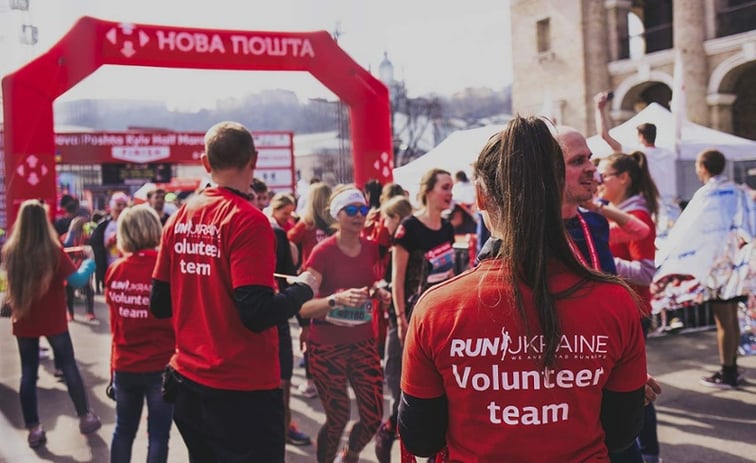 Volunteers play a very important role in sporting events.
Volunteers play a very important role in sporting events.
Sports organizations are increasingly taking fan engagement into account. How has it evolved over the years?
Academics have devoted great attention to it over the last 10-15 years. It’s still a trend in the sports industry and I’m pretty sure we will still continue to invest in engagement for a long period of time. In the 1990s, more or less most organizations, and mainly if you think in the United States, were concerned with transaction, how could they make fans purchase more tickets, more merchandise. Then, in the early 2000s, things changed a little bit and sport organizations, especially those that are more professional, made the effort to develop better relationships with fans, providing better services so fans are satisfied and loyal. Mainly because of social media, fans now have the opportunity to interact with their teams 24 hours a day, 7 days a week. So, it’s more than making sure the services are good, it’s mainly about engaging them, about making sure that fans can interact with the team every time they want. Engagement is also about that. I would say it’s almost like a consequence. It’s an evolution from the idea of relationship to the idea of engagement. Now, it’s not enough to have them recommending a friend to attend a game at Camp Nou, for example, and to be happy. That’s not enough because fans want to interact with FC Barcelona while they are at home, they want to interact with other Barcelona fans, to be part of the community. So, this idea of fan engagement is related to that. It’s what allows teams and fans and other stakeholders to be connected every time.
“Fan engagement is more than making sure the services are good, it’s mainly about engaging fans, about making sure that they can interact with the team every time they want; it’s an evolution from the idea of relationship to the idea of engagement.”
Is the purpose of fan engagement to understand consumer behavior or to change it?
I would say neither one nor the other. Of course, it’s important to understand them, but the purpose of fan engagement is about making sure that fans are in touch with each other, that they are part of the community, that they can help the team and the team can help them to create a more meaningful life and value for all parts involved. Obviously, fan engagement is related to benefits for the team, but it’s more than that. I would say that every team wants to have highly engaged fans, but sometimes highly engaged fans can also be detrimental for sports organizations because of the continuous criticism, some disruptive behaviors, negative messages on social media, and all of that. I would say that understanding consumers is one of the things that is important. Shaping the fans’ behaviors is also an important thing, but mainly the idea is to create a two-way communication process. To allow fans to have voice, to help the team, to feel that they are part of the community, and to learn with that to improve the services of the team and the relationship team-fans.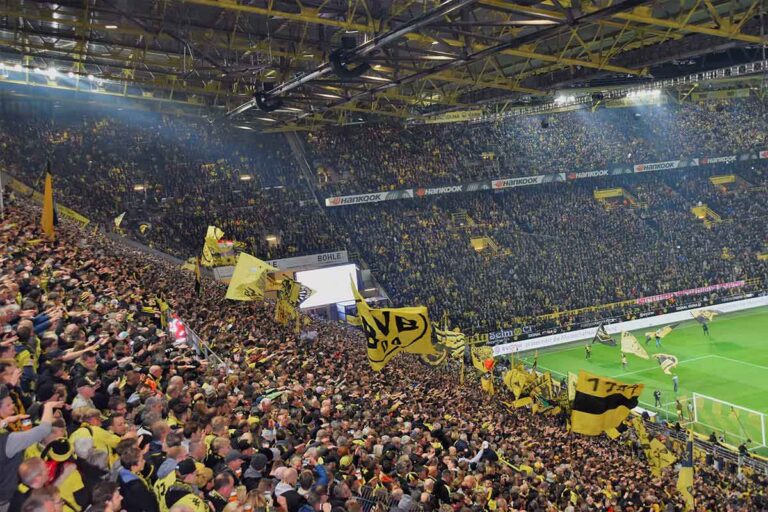 Borussia Dortmund supporters are always very active in the grandstands.
Borussia Dortmund supporters are always very active in the grandstands.
Now that the issue of criticism is on the table, I recall the uproar that was created on social media when Cristiano Ronaldo and Pogba took a stand at a Euro2020 press conference against the consumption of Coca Cola and Heineken, official sponsors of the competition. What is your opinion on this? Can such an action damage the image of a brand to the point of losing consumers?
In this kind of situation, there is always the potential for positive and negative reactions from fans, but definitely there is the potential to damage the image of those sponsors. There is the potential for many fans to stop consuming or to start developing negative attitudes towards those brands. The thing is, fans follow teams, fans follow athletes, they don’t follow sponsors. And, for the sponsor, obviously, with the help of the athlete that endorses the product when that’s the case, and with the help of the team, they always need to work together. But the role of the sponsor is to ensure that fans perceive the fit between the sponsor and the athlete or the team, or in this case, the event, the Euro2020, as an authentic relationship. If fans don’t perceive that there is a logical fit between that company and the team or the event that they are supporting or following, or if they feel the relationship is not authentic, they will probably react in a negative way towards the sponsor.
“The role of the sponsor is to ensure that fans perceive the fit between the sponsor and the athlete or the team, or in this case, the event, the Euro2020, as an authentic relationship”
So, when Cristiano Ronaldo says ‘you should drink water’ and when Paul Pogba says ‘don’t drink alcohol’, those who follow Cristiano and those who follow Pogba will probably adopt the same attitude because they worship them. Nevertheless, it needs to be clear all time what athletes should and shouldn’t do regarding event sponsors. And in a way, it’s also the responsibility of Heineken or Coca Cola or whatever brand, to articulate the message to ensure that fans understand why they are linked to an event or team.
So, I think one of the best examples is the classic endorsement of Michael Jordan and Gatorade. The slogan ‘Be like Mike’ was very popular, all the ads were saying ‘Be like Mike’, so drink Gatorade and you will be like Mike. If you apply the same rationale here, if my idol does not like beer or Coca Cola, and I want to be like Cristiano or Pogba, in this case I should not drink beer or Coca Cola. So, it definitely has the potential to be very damaging for the sponsors, but of course it also depends on how the companies deal with the situation. I think Heineken did a very nice job. They posted on Twitter saying something like ‘we know Cristiano Ronaldo prefers water, but let’s celebrate the fact that he is a great player’. So, by doing that, they soften fans, they ensure that they are still relevant, that their fans are still in a good mood. So, when athletes criticize sponsors, the brands need to be smart enough to understand that they should not go against the athletes, and to make the best of the situation. And I think Heineken, not just in this case, also in many other cases, is a very good example of how to navigate these challenges and do a good job.
“Heineken responded to the action posting on Twitter saying something like ‘we know Cristiano Ronaldo prefers water, but let’s celebrate the fact that he is a great player’. It’s a great example of how to do a good job”
How has technology influenced the resizing of fan engagement?
I would say it was like the main driver. Technology now allows fans to be connected with their teams 24/7, creates a lot of contact points, creates a two-way communication, allows clubs to shape fans behaviors, allows sports organizations to shape their strategy. And of course, this is not just about social media and technology, but think about the Super League and the criticism of fans on social media, for example. Of course, the decision to go back was not just based on that, but I’m sure it has some kind of impact on that. So, fans now have a voice, they are empowered partially because of social media and other technologic developments.
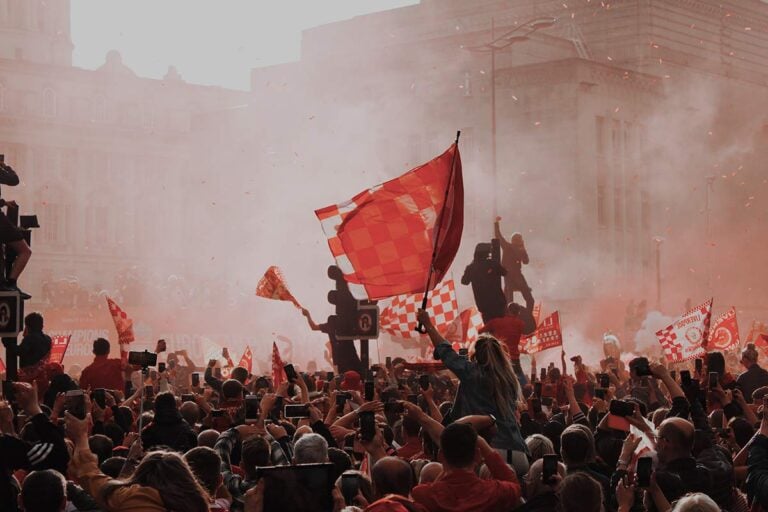 Live experience is and will be always the core. Fans can take a picture and post in on social media, but it’s a complement.
Live experience is and will be always the core. Fans can take a picture and post in on social media, but it’s a complement.
But although the technology was the main driver, the live experience is very important and it will continue to be so in different ways. People still want to be there to watch the game live, to watch Messi playing, to see Pep Guardiola arguing with the players. That’s the reason why people like sports and whenever people have the possibility to attend a live game, they will still do it. After that, they will probably take a picture and post it on social media, but that’s a complement. Technology is a complement, promotes even better experiences, but it’s not the core, because the essence of sport is the game, the competition in the field, it’s the emotional environment.
“Technology now allows fans to be connected with their teams 24/7, creates a lot of contact points, creates a two-way communication, allows clubs to shape fans behaviors, allows sports organizations to shape their strategy”
Studies on the internet behavior of the new generations show that a good part of younger consumers avoid being tracked. How can we get to know their behavior towards our brand, club or organization? Is it increasingly difficult to identify them?
It’s difficult but possible. There are platforms to help monitor the behaviors of different individuals, even if they are not identified, but with data triangulation in different platforms and advanced techniques to collect data, it is always possible. On the other hand, it’s different what they say from what they do. Younger generations, mainly, don’t like to be tracked, but their behavior on social media allow people to track what they do… So in between what they say and what they do there is typically a huge distance. And, according to my research, if they understand that they are helping either the athletes or the team they typically accept and like to participate.
I have conducted studies with some teams and sometimes fans reply to the teams to say, ‘if you want me to participate in interviews, I’m available to help’. So, I’m not saying that this happens all the time, but at least from my experience, when fans -even younger fans- feel that they are helping, they are willing to participate in studies. So, monitoring that data triangulation, advanced data collection techniques, applying regular surveys, being in touch with them on social media, all of that is possible to still be in touch with them and to understand what they feel.
Technology has helped to maintain fan engagement during the Covid sport shutdown. What practices will continue to be used?
Technology is useful to complement live experiences, to ensure that fans have a voice and teams will have to use more technology to be connected and to provide better experiences. Practices like hybrid events, for example, might actually be one thing that some organizations might start to look at as a permanent practice. During the last season NBA playoffs, they had remote access for fans. It was a practice that many other leagues adopted. So, this idea of having remote fans in addition to live fans might be something that some organizations will do in the present and in the future. Remote virtual tours are also something that I believe to be useful, live chats with athletes… So, in generic terms, I would say one of the lessons from Covid is technology needs to be used to make sports organizations more inclusive to ensure that regardless of where you are, you are still part of the community. And another thing is that sports organizations probably start to look not just at how fans can benefit them, but how they can they benefit fans.
“Hybrid events, virtual stands, virtual tours and live chats with athletes are practices adopted during Covid that some sport organizations might keep in the present and in the future”
Some organizations actually did very good things and use social media platforms to help fans and to help communities. We can continue to adopt the best practices that were adopted during Covid and technology plays a big role in that.
Let’s talk about the esports factor. Football clubs and leagues are increasingly entering esports. What can football clubs learn from the esports industry to increase their fan engagement mainly with the younger generations?
I think esports are here to stay whether or not people like it. Esports can be, and are already in many cases, a good route to connect especially with young consumers, to help younger consumers connect with athletes, to promote some offline activities of the team, to ensure followership of the teams. Also, some of the features of these sports might actually be useful for teams to learn how to connect online with fans.
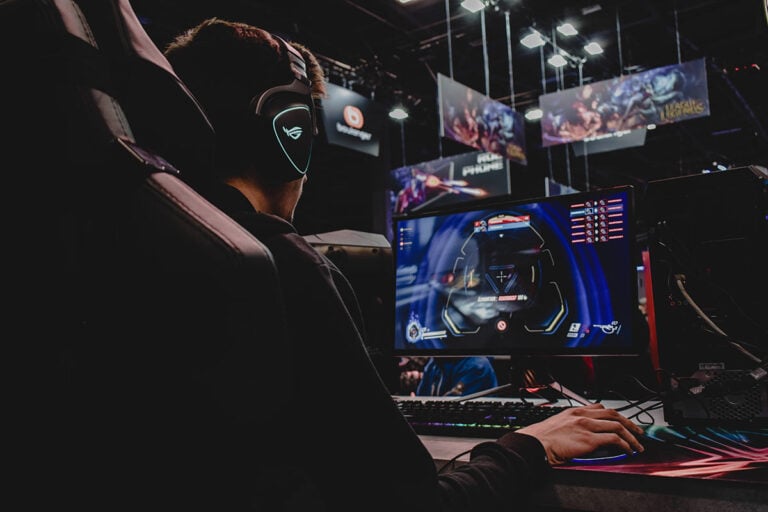 Esports are a root to engage younger generations.
Esports are a root to engage younger generations.
But, at the same time, I think there is still a gray area here, a gray cloud around the esports in things like addictive behaviors, health-related issues… So, to be quite honest, I think esports are here to stay, we can and should learn from esports, and use them as a way to attract young consumers, definitely, but we need to be careful. If you think about football teams and footballers, they have a very prominent role in society, they influence a lot of people. So, I think we need to be careful in how to use esports, and we need to research and to learn more about esports to ensure that we can actually use it for the good of everyone and that we don’t damage people’s minds and that we don’t do something that is detrimental for the society. So, esports can be used to generate more financial benefits for the teams, can and should be a root for engagement, but we need to be careful because of some damaging practices, and we need to learn a bit more about the good things of esports and to prevent the bad things of esports.
This article was originally published by Global Sports partner the Johan Cruyff Institute and can be viewed here.
Search the latest and greatest job opportunities in sport
In the world of professional sports, sponsorship represents a significant source of revenue and plays a vital role for t...
Read moreThe sports industry is a vibrant and multifaceted industry, made up of a diverse range of sectors that shape its global ...
Read morePablo Romero, director of protocol at Sevilla FC and lecturer in the UCAM Master's Degree in Sports Management, shares t...
Read more